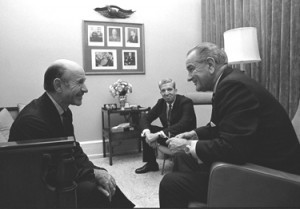
On November 22nd 1963, conductor Erich Leinsdorf of the Boston Symphony Orchestra was in mid-performance when he received the news of Kennedy’s assassination.
On the other side of the Atlantic, Kingsley Amis was having dinner with the journalist George Gale. Gale took a telephone call in another room. Amis heard him shout “No!”, and then saw him pull on his coat and leave.
At Symphony Hall in Boston, the microphones were on and running. You can hear the audience respond to the horrible news. Their reaction, and that of the orchestra, does them considerable credit:

When I was an fresher (’64-’65) someone in the common room rehearsed the claim that everyone could remember where they were when they heard news of the Kennedy assassination. There was silent assent until I piped up and said that I didn’t; maybe I was at the barber’s? No; it was agreed the barber’s would have shut by then. So I was stumped. Others then spoke up and something like half of us admitted that we couldn’t remember.
It was a big deal for Americans, no doubt, but less so for other people. And much that’s written about his time as President is tosh: there was no Camelot metaphor at the time – that came afterwards. As did the revelation of how tawdry the man was.